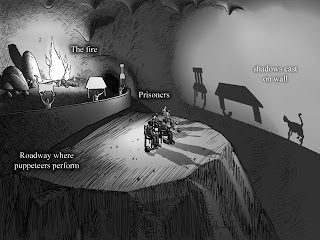If you have not yet gotten your essay to a 3 or above, or if you have not raised your word count to between 600 and 750, you should get those things done.
However, if you have gotten your essay to above 3, and between 600 and 750 words, copy and paste the following exercises into a Word document and. Complete the exercises and then email them to me. Please send the finished exercises in the
body of the email rather than as an attachment. Thank you.
 Break these long sentences into short, single-idea sentences.
Break these long sentences into short, single-idea sentences. Bobby, Skanky, and me were following our friends to Atlantic City, New Jersey and it was a dumb car ride all the way there and we were hitting and beating each other so when we got to Atlanta and our hotel room wasn’t ready so we went swimming for an hour then we went to the Silk Sleeve to play some foozball. When we got done we went to the room and found a big old bucket of glue on the way so Bobby opened it and took a few sniffs so I took a few sniffs because he called me a weenie and I am not a weenie so I took some. Then we went and ate at Under the Milky Way and it was really good then we went back to the room and got changed to go swimming again.
Skanky took a really big sniff and I took a few more little sniffs and we went swimming till 11 O'clock then we walked over to the Sleeve and played foozball for an hour then me and Skanky walked to the casino and we went to the gift shop and I bought a Pepsi and Skanky got a Dr. then we walked around the casino and avoided the security so we didn't get caught and kicked out of the casino then it got really boring so we walked back to the hotel and went to our room and watched American Idol till 11:45.
Then we paused the movie and watched the ball drop then Sheila came to our room and seen the bucket of glue on the table and Bobbie asked her if she wanted a sniff. She left the room and she went and called my mom and my dad and they called my cell phone and they asked if we had sniffed any glue and I said yes so she got way mad and told us to dump the rest out so we did. But it was kind of funny because that night Bobby got up cause he wanted to whiz and on the way he tripped over the garbage can where the bucket was and it totally spilled all over the floor and the next morning we saw that it had glued the garbage can to the floor.
The next morning we woke up and we ate at McDonald’s and then we were on our way home. When we got home my mom had a big long talk and I got grounded and my dad took my truck away and Bobbie got sent away to the school for glue sniffing kids. Then I saved my money and bought another truck but it doesn’t have wheels yet.
 Break this up into paragraphs
Break this up into paragraphsSixteen and invincible, one whole year driving now and I have yet to up yet. As I hear the stories of hitting dears, running into signs, rolling off in the bar ditch, following the car infront of you too closely, I laugh to my self, ponder how easily such an incident could be avoided, how I could out manuver a deer, and never fall asleep at the wheel. I had almost become one of these people one night. We was on our way to grandma's house, the car was pretty noisy, it was about eleven, so we decided to stopped at a gas station for some drinks and a restroom stop. Some of the circumstances still unknown to me, I believe it was kind of my fault, I should have been more caution, but the other driver had a play in it too. We was coming down the on ramp, and I had stopped at the sign, waiting for some traffic to pass by, figured that I was clear, but something distracted me, and before I knew it, I had moved us out in front of a semi. It was my fault, only because I bet there was a thousand feet between me and him, but I guess he was moving a lot faster then I thought and I should of paid more attention to this. My absentmindedness may have caused this not so smart decison, but thanks to lighting-fast youth reaction combined with Dodie's nice engine, we narrowly got of the way fast enough. Those big headlights coming at us fast, the sound of his horn blaring, I think about it from time to time, but it rarely crosses my mind. Life went on, we forgot about it, I was shook up a little, but it soon left my mind, that fear that compelled me to be cautious the rest of the trip. Few weeks up the road, we went to Preston for a cousin's birthday party during the summer, and as always we took the carter cut off through Kemmer, and on through Cokeville to the border, well we pulled out of Preston about eight, so it was late getting home. We had passed through cokeville, and was getting through the curvy canyon, particularly close to the Kemmer junction, crossing that bridge that you go across before you start seeing mines. Coming right out off of that bridge, we rounded the bend, I didnt spot it until about one hundred yards away, the roads one hundred percent pretty clear so I was nearly seventy mph. I slammed the breaks, and seeing that the other lane was open, I manuvered over, as the deer wasn't moving out from our lane. I was down to about thirty when we passed by it, but right as we drove passing, it whiped it's head around to face us, and we raked his antlers with the side of the car. I can still remember the rush of fear, my mom's arm shooting out to brace me for impact, the face of the deer as it turned at the worst moment. It wasn't hurt, it sure took off in a hurry actually. With but a couple of scratches on the hoof of the car, and about delivered my mom a heart attack, but I still learned from that experience, I never forget it, and I am always careful on that road, and now I am a very safe driver. Bottom line, life isn't a video game, you're not invincible, and you can't just restart from your last save if you goof up. Don't be cocky, anything could happen in the blink of an eye. That is the point.
 Plot this story on a story graph. Place bolded numbers at the beginning of each sentence that has a plot point, then use those numbers to label the ups and downs on your story graph.
Plot this story on a story graph. Place bolded numbers at the beginning of each sentence that has a plot point, then use those numbers to label the ups and downs on your story graph. My grandpa was the best grandfather any child could have. He was the kind of person that gave you whatever you wanted, whenever you wanted. He loved all of his grandchildren equally, he never took sides with anyone, he was always there for us when we needed him, and most of all, he had the most tender heart in the world.
One night, I was at a youth dance at my school. My dad came around 9:30 to pick me up. He was crying. I asked him what happened, he told me that grandpa was in the hospital and that i needed to go and visit him. So, that night, i went to the hospital and stayed with him the whole night. It was fun being around him because, I wasnt really that close to him. I mean, yeah, we would talk, but he would usually just ask me how school was going and stuff, other then that, we wouldnt talk at all, but i still thought he was the coolest person in the world. That night at the hospital, changed how i felt about everything. He was so much fun to be around, he had a passion for music as much as i did, he loved to talk, like i do, he liked to be active no matter what. I learned so much about him that night. So, i stayed with him every night he was in the hospital.
One day, in the hospital, he told me that he wanted to teach me how to play the Ukulele. So, i went home and got an Ukulele and came back to the hospital. He started teaching me what notes matched what chords etc... He taught me how to play "Twinkle, Twinkle, Little Star", and i thought i had accomplished so much just by being able to play that song. He was in the hospital for 2 weeks and i stayed with him every night. Every night, i learned how to play a new song, and learned another thing about him. One day, my grandma and I went to get him some lunch. When we returned, I could hear singing in the room. When we walked in,, it seemed as though he wasnt sick at all. He was entertaining the guests and other patients in his room. A i stood there, i couldnt help but cry because of how strong his spirit was in that hospital. That moment welded itself into my heart. I was able to learn so much from just being in his presence.
One Friday afternoon, the doctors came in to check on him. They told him that they would keep him for the weekend and that he could go home on Monday. He was very excited. After staying with him for 2 weeks and taking care of him, it was kind of a relief that he was able to go home, and i thought to myself how nice it would be to finally be able to get some rest. Saturday night came around and my dad came down to the hospital to visit him and to take some of his stuff home. He still was pretty excited that he got to go home soon. Sunday came and i didnt go to church because i was still down at the hospital with my grandpa, making sure that he was going to be safe. I told him i was getting ready to go home, since he was going to be able to come home tomorrow anyway, so I just told him that i would see him back at home. I really needed to go home and catch up on 2 weeks worth of sleep. So, that night, before I left, he gave me a blessing and in that blessing, i was told to continue doing good, and continue having the sweet spirit that i did. I was told of how blessed i would be if i did this, and then he told me not to ever forget him because he loved me and didnt want me to forget him when he was gone. I was surprised that he was telling me this because i was pretty sure that he would be coming home in the morning. So, i left that night thinking really hard about if I really wanted to go home and sleep, or if I wanted to stay just in case something happened. The doctors told me not to worry, he was perfectly healthy.
Monday morning, i woke to my phone ringing. I tried to answer it before it stopped but, it died, so i ran to my room and got my charger then came back out to the living room. I plugged it in, and it took my phone a while to start ringing again. When i answered it, all i heard was someone crying on the other line. I started panicking and so, I said, "Hello"? and then i heard my Grandma on the other line. She was crying so hard it was hard for me to make out what she was trying to say. Then she said, " Grandpa died". My phone dropped and i just stood there and cried. I didnt know what to do. It was 7 in the morning, and i didnt know what exactly to do. So, i went into my dad's room and woke him up and told him that Grandpa had passed on. We arrived to the hospital at 7:30. It was very heart breaking. I saw the nurses pulling out a gurney and i say a body on it. I wasnt sure that it was my Grandpa, but then i noticed the name on the side. I was hurt so bad.
I believe that this obstacle happened for a reason. It helped me realize that I shouldn't be taking life for granted. It taught me to make the most of my life with what I have and the people that i share it with. I was taught to take what i have and use it to help other people just like my grandpa did. Im so grateful for him and for the examples he was able to set for me and that i was able to learn from them. Although he is gone, he still remains with me through his music and through his spirit.





 Break this up into paragraphs
Break this up into paragraphs Plot this story on a story graph. Place bolded numbers at the beginning of each sentence that has a plot point, then use those numbers to label the ups and downs on your story graph.
Plot this story on a story graph. Place bolded numbers at the beginning of each sentence that has a plot point, then use those numbers to label the ups and downs on your story graph.

 For more on this click here
For more on this click here We worked on outlining the stories we wrote for bellwork according to this essay's format, outlining three events that act as turning points in the story, and then presenting our thesis at the end.
We worked on outlining the stories we wrote for bellwork according to this essay's format, outlining three events that act as turning points in the story, and then presenting our thesis at the end. Take, for example, the following question.
Take, for example, the following question.






 This piece of furniture has a place to rest your bum. We're OK with it having no legs, but, it has no back. However, many of us were still willing to call it chair, thus expanding our definition yet again so that now a chair can have between zero and ten legs and have no back.
This piece of furniture has a place to rest your bum. We're OK with it having no legs, but, it has no back. However, many of us were still willing to call it chair, thus expanding our definition yet again so that now a chair can have between zero and ten legs and have no back.



